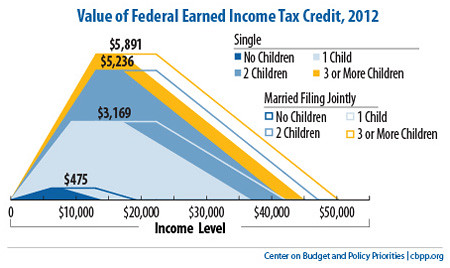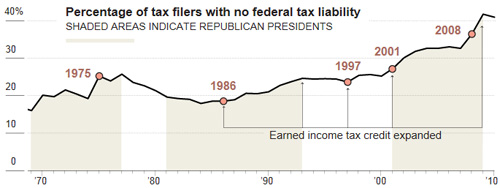Romney Haunted by Reagan's Ghost
During his failed 1994 Senate race, Mitt Romney tried to reassure liberal Massachusetts voters that "I was an independent during the time of Reagan-Bush; I'm not trying to return to Reagan-Bush." Now, Reagan's ghost is getting his revenge.
After Romney defended the carried interest exemption that allows him to pay a lower tax rate than many middle class families, the Gipper's apparition emerged from 1985 to insist that "the millionaire ought to pay more in taxes than the bus driver." And now that Mitt Romney has slandered the 47 percent of Americans who pay no federal income taxes thanks to measures like the Earned Income Tax Credit (EITC), the ghost of Reagan is haunting him once again.
As BusinessWeek explained, it was with good reason that President Reagan described the EITC as "the best anti-poverty, the best pro-family, the best job creation measure to come out of Congress."
Reagan strongly supported the Earned Income Tax Credit (EITC), which sends checks to Americans who work but earn less than around $46,000 a year, depending on family size. Recipients of the credit are among those who don't pay income tax, but Reagan never regarded that as a problem. His administration estimated that the 1986 reform of the tax code would remove 6 million working poor from the tax rolls. Reagan called the reform a "sweeping victory for fairness" and "perhaps the biggest antipoverty program in our history."
Which is exactly right. While virtually all working Americans shell out payroll taxes to Uncle Sam (and about three-quarters of all American households pay more in those taxes for Medicare and Social Security than in income taxes), incentives like the Earned Income and Child Tax Credits keep millions off the unemployment rolls and out of poverty. According to the Center on Budget and Policy Priorities, the EITC, which for a couple with two children provides a $5,000 refund at $20,000 in income to zero above $46,000, lifted 6.3 million Americans above the poverty line, including 3.3 million children. (The Child Tax Credit expanded by President Bush helped another 1.6 million children and 2.9 million people overall live above the poverty line.) As Suzy Khimm of the Washington Post documented, there can be little question that these measures succeeded as designed in reducing dependency on government:
"[T]he overwhelming finding of the empirical literature is that EITC has been especially successful at encouraging the employment of single parents, especially mothers," according to economists Nada Eissa and Hilary Hoynes, in a 2005 study cited by the Center on Budget Priorities.
Another study by University of Chicago economist Jeffrey Grogger found that the expansions of the EITC during the Clinton years "appear to be the most important single factor in explaining why female family heads [of households] increased their employment over 1993-1999″ -- helping to increase single mothers' employment and decrease the welfare rolls, perhaps even more than Clinton's 1996 welfare reform law, the CBPP continues. Altogether, "expansions of the EITC in the 1990s induced more than a half a million families to move from cash welfare assistance to work, according to research by economists Stacy Dickert of Michigan State University, Scott Houser of the Colorado School of Mines and John Karl Scholz of the University of Wisconsin-Madison."
The return on investment doesn't end there. A 2011 study by Harvard and Columbia researchers showed that the EITC raises children's test scores and which also "increase students' probability of college attendance, raise earnings, reduce teenage birth rates, and improve the quality of the neighborhood in which their students live in adulthood."
All of which is why, as Khimm rightly notes about these government policies proven to help families out of poverty and into self-sufficiency, "until now, Republicans have been such fans of them." Among those Republicans, Mitt Romney and his allies are learning the hard way, is the ghost of Ronald Reagan.



